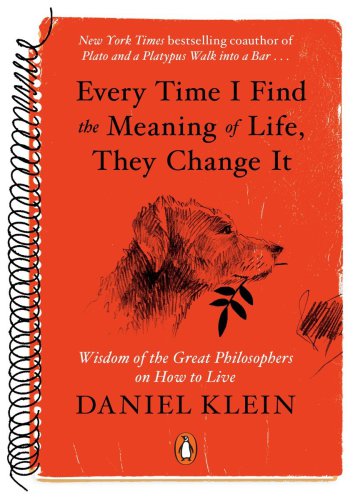
Every Time I Find the Meaning of Life, They Change It
Wisdom of the Great Philosophers on How to Live
کتاب های مرتبط
- اطلاعات
- نقد و بررسی
- دیدگاه کاربران
نقد و بررسی

July 1, 2015
A miscellany of concise advice about life. Like many people in their 20s, Klein (Travels with Epicurus: A Journey to a Greek Island in Search of a Fulfilled Life, 2014, etc.) asked himself some age-old questions: what is the meaning of life? How does one live a good life? He sought answers from his readings as a Harvard undergraduate and later as a graduate student in philosophy, jotting down salient quotations in a notebook he called "Pithies." Now, 40 years later, the author offers an expanded collection "of concise philosophical precepts" along with candid personal reflections on each. Among his many sources of inspiration are Pascal and Epicurus, David Hume and John Stuart Mill, William James and Albert Camus. But Klein finds wisdom from such popular sages as Woody Allen, John Barth, and Walker Percy and from contemporary philosophers, such as Oxford-trained "techno-hedonist" David Pearce and analytic moral philosopher Derek Parfit. Klein cites Albert Einstein's praise of solitude ("delicious in the years of maturity") and Emerson on "the blessings of old friends," and he admits that ethicist Peter Singer makes him feel "bad about not being good." Moral philosophy, writes the author, "with its abstract arguments about the principles of right and wrong, is not really that relevant to our lives" but "may only be a luxury for those of us who do not need to struggle simply to stay alive." He reveals that he's had past bouts of depression and times when he felt overwhelmed "by the meaninglessness of it all," but he never lost his conviction that life is worth living. As an agnostic, he agrees with atheist Sam Harris' "crucial distinction between religion and mysticism." Mysticism, as Ludwig Wittgenstein wrote, "wonders not how the world is but that the world is." A glossary explains the relatively few philosophical terms Klein sprinkles in this warm, winsome book of eclectic musings.
COPYRIGHT(2015) Kirkus Reviews, ALL RIGHTS RESERVED.

September 1, 2015
In his early 20s and 30s, Klein (Plato and a Platypus Walk into a Bar...; Travels with Epicurus) kept a notebook titled "Pithies," containing his favorite philosophical quotes. He hoped that they would become a guide on how to live a meaningful life. However, the notebook was eventually packed away and not consulted again until now, with the author in his eighth decade. This book is Klein's musings upon the quotes he favored in his youth and what they taught, and still have to teach, him and others. The sayings include a wide range of philosophers and philosophical schools of thought while his reflections span the stories behind an entry's inclusion to a thought on a particular quote's logical implication for the individual and, sometimes, society. The chapters are short, making this a book that easily lends itself to brief, meandering reading spurts. The only downside? All the quotes are from authors in the Western philosophical tradition. VERDICT A delightful book that is easily applicable to any stage of life. Even when explaining the underlying theories behind a quote, the author's writing is understandable for readers who have no prior philosophy background. Yet, philosophy students will also enjoy seeing the discipline applied to everyday life.--Laura Hiatt-Smith, Conifer, CO
Copyright 2015 Library Journal, LLC Used with permission.

September 1, 2015
When Klein resolved as a young man to find the best way to live, he began compiling a notebook of sayings culled from the greatest philosophersAurelius, Epicurus, Pascal, Camus, and othershoping these maxims would open a path for him. Though he abandoned this project decades ago, judging it foolishly naive, he here retrieves that discarded notebook, offering it to readers not as a completed credo but rather as a series of engaging reflections on issues everyone confronts. As he amplifies each of the philosophical quotations with his own musings, he opens perspectives on widely shared perplexities. Readers thus join Klein in pondering with Epicurus the problem of misdirected desire, teetering with Camus on the precipice of suicide, puzzling with Pascal on the ultimate wager of faith. To the degree that any thread unifies these idiosyncratic wanderings in philosophy, it is a thread of cerebral hedonism: Klein invites readers into the intensely personal philosophizing that invests every moment with radically personal pleasure. A refreshingly spontaneous plunge into deep thought.(Reprinted with permission of Booklist, copyright 2015, American Library Association.)

























دیدگاه کاربران